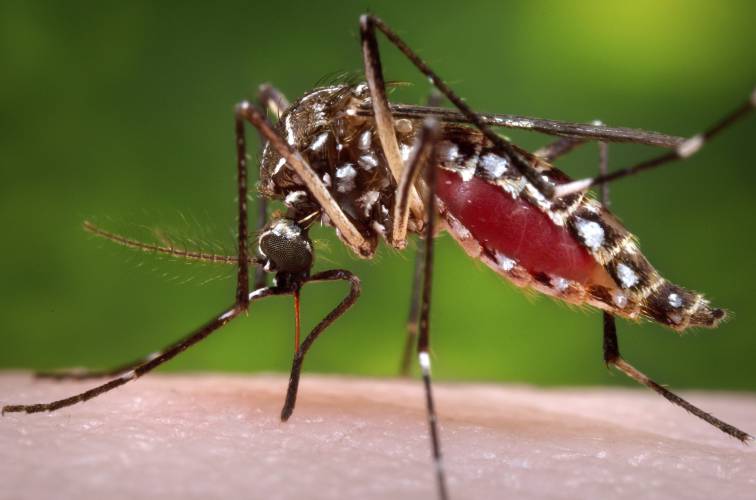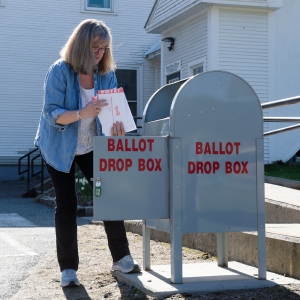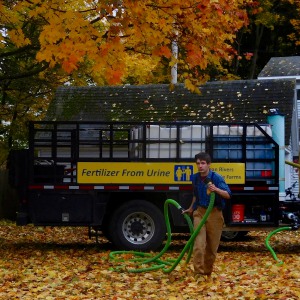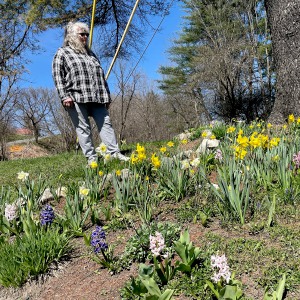Wet weather brings banner year for mosquitoes in New England

FILE - This 2006 file photo provided by the Centers for Disease Control and Prevention shows a female Aedes aegypti mosquito in the process of acquiring a blood meal from a human host. A study published Tuesday, Oct. 18, 2022, in the journal Cell, finds that certain people really are “mosquito magnets” who get bitten more than others — and it probably has to do with the way they smell. (James Gathany/Centers for Disease Control and Prevention via AP, File) James Gathany
| Published: 08-12-2023 10:51 PM |
WHITE RIVER JUNCTION — Vermonters are swatting at twice as many mosquitoes this summer than the seasonal average over the last decade. As the climate warms, some scientists say that the pesky population boom is a sign of things to come.
To stay safe and itch-free, health officials are asking residents to undergo what might be a tough thought experiment: Become your enemy; think like the mosquito.
The probability of stumbling upon a mosquito oasis increases with flooding and torrential rain, of which Vermont has had plenty. When rivers jump their banks and rain falls in heavy sheets, water is more likely to wind up in places it doesn’t usually reach, said Patti Casey, the environmental surveillance program manager for the Vermont Agency of Agriculture, Food and Markets. She runs a mosquito surveillance workshop for the state and identifies mosquito species at a lab in Randolph.
“It’s good to walk through your property as if you’re a mosquito,” she said, cleaning up the water that looks appealing to you in the insect charade along the way. The insects are increasingly heard — and unfortunately felt — zipping around pools caught in tarps or woodpiles and “a lot of other places you wouldn’t think of,” she said.
Those areas usually stay wet long enough for mosquitoes to breed. “When water temperatures are warm enough, they can go from egg to wing in about five days,” Casey said. “We have a ton of mosquitoes right now, and it has everything to do with all this water.”
Climate change models predict general increases in rainfall in New England, and wetter weather paired with rising temperatures is a recipe for mosquito disaster, said Matthew Ayres, a Dartmouth College biology professor. Hotter summers in northern states reel in new mosquito species from the South.
The West Nile virus, a potentially fatal virus carried by mosquitoes, is typically detected in insects a few times a year in Vermont. But as the range of carrier species expands, this could be more of a problem in the future, Ayres said.
“These mosquitoes knocking on our door right now are vectors of some really bad diseases,” he said. Culex, a genus of mosquito that can carry West Nile and Eastern Equine Encephalitis, another fatal virus, is likely to be headed in droves for New England.
Article continues after...
Yesterday's Most Read Articles
 Dartmouth administration faces fierce criticism over protest arrests
Dartmouth administration faces fierce criticism over protest arrests
 Hanover house added to New Hampshire Register of Historic Places
Hanover house added to New Hampshire Register of Historic Places
 Sharon voters turn back proposal to renovate school
Sharon voters turn back proposal to renovate school
“With them, there are going to be increased exposure of horses and people to (those diseases),” Ayres said. “And these are bad diseases. There are no treatments or vaccines.”
Even a handful of members of a virus-carrying mosquito species could be enough to start a colony in the Twin States, Ayres said. “Some of those get a blood meal, lay eggs, and then eventually you get a population established,” he said. “It’s almost inevitable. It’s hard to imagine that this isn’t going to happen.”
The question that remains, he said, is how well humans can adapt.
Mosquito species that breed in floodplains are typical to the area. They breed in the spring with snowmelt, laying one batch of eggs a year, said Casey, of the Vermont Agency of Agriculture: “They come out and have their big heyday, and then they pretty much die down.”
But many of the species Casey’s team is finding now like to breed under trees, at the edges of marshes and other places where there’s cover. That could throw a wrench in some of Vermont’s mitigation plans.
“If you were going to apply (chemical treatment) with a helicopter, it’s impossible to reach some of those areas,” she said. “You have to know what mosquito species you’re targeting, or you can spend $50,000 on a mosquito treatment and then not really reach anything.”
Meanwhile, Casey said to proceed with caution, but that there’s no need to opt out of outdoor time.
“You can’t eliminate risk entirely, but yes, people should be covered up and doing what they have to do to avoid mosquito bites,” she said.
Buy insect repellent registered with the Environmental Protection Agency, limit going outside during times when mosquitos are active — usually around dawn and dusk — and don’t leave windows open without a screen, she said.
“I know we’ve had some wacky weather, but when it’s nice, you can protect yourself and still like being outside,” Casey said.
“Don’t let all of this keep you from enjoying Vermont in the summer.”
Frances Mize is a Report for America corps member. She can be reached at fmize@vnews.com or 603-727-3242.

 Art Notes: Canaan Meetinghouse showcase brings musicians and listeners together
Art Notes: Canaan Meetinghouse showcase brings musicians and listeners together A Look Back: Upper Valley dining scene changes with the times
A Look Back: Upper Valley dining scene changes with the times The future of fertilizer? Pee, says this Brattleboro institute
The future of fertilizer? Pee, says this Brattleboro institute From dirt patch to a gateway garden, a Randolph volunteer cultivates community
From dirt patch to a gateway garden, a Randolph volunteer cultivates community 
